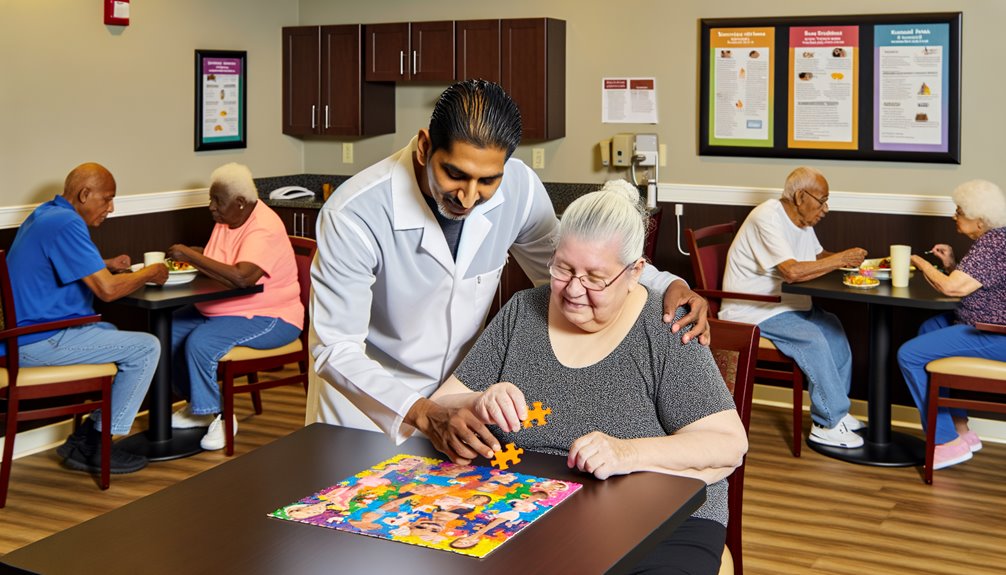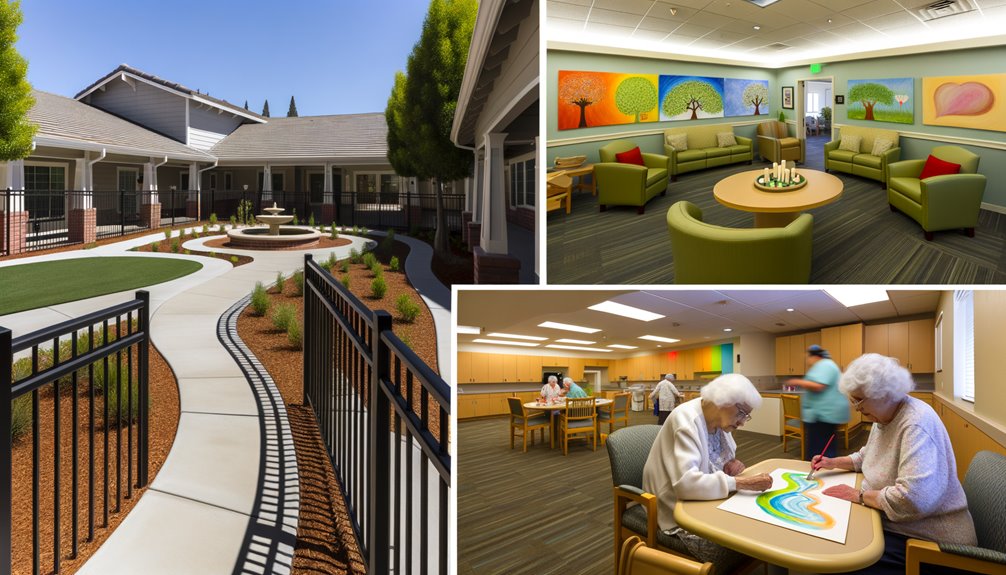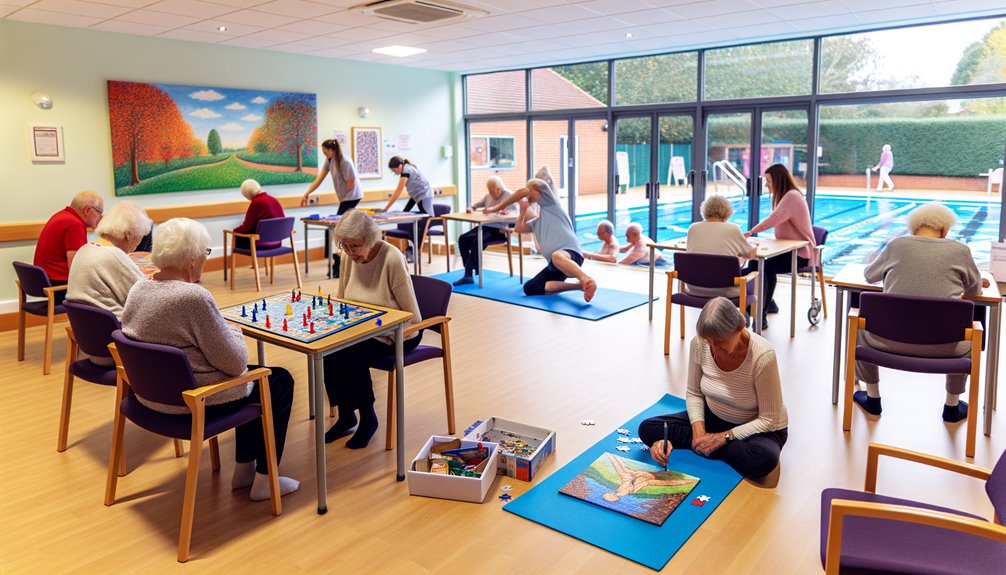Dementia Care Services That Make a Difference: What to Expect
When caring for a loved one with dementia, you can expect a variety of care services tailored to their needs. You might consider home care, which offers a familiar and comfortable environment, reducing confusion and anxiety, and often leading to better health outcomes. Assisted living and specialized memory care facilities provide 24-hour supervision, assistance with daily activities, and engaging programs. These services also include personalized care plans, cognitive stimulation activities, and socialization opportunities. Additionally, there are support services for caregivers, such as respite care and weekly support groups. As you explore these options, you'll find more ways to enhance your loved one's quality of life and your own well-being.
Key Takeaways
- Specialized Care Environments: Residential memory care facilities offer 24-hour supervision, assistance with ADLs, and specialized memory care programming in a secure setting.
- Personalized Home Care: Home-based care provides a familiar environment, consistent health monitoring, and personalized care plans to address individual needs and challenges.
- Improved Health Outcomes: Home care can lead to better health outcomes, reducing hospital stays and the need for institutional care by maintaining a comfortable and low-stress environment.
- Engaging Activities and Socialization: Both home care and memory care facilities offer activities and socialization opportunities to boost cognitive function, confidence, and overall well-being.
- Comprehensive Support for Caregivers: Support services include caregiver resources, support groups, respite care, and educational programs to help manage the emotional and physical demands of caregiving.
Types of Dementia Care Services

When considering dementia care services, it's crucial to understand the various types available to guarantee you find the best fit for your loved one's needs. Residential memory care facilities offer a home-like setting with 24-hour supervision, assistance with activities of daily living (ADLs), medication management, and specialized memory care programming. Assisted living facilities with memory care programs provide similar services but may offer more independence.
Adult daycare centers provide daytime care, including supervision, ADL assistance, and social activities. Home-based care involves caregivers, such as family members or home health aides, providing support in the person's own home. Each type is designed to ease care shifts and guarantee continuous support. A thorough memory assessment can help determine the most suitable option, ensuring a smooth shift and the right level of care for your loved one. Facilities like Sage Oak of Denton are known for their curated care model, ensuring personalized attention tailored to cognitive function and changing needs.
Benefits of Home Care for Dementia
Home care for dementia offers several significant benefits, particularly in maintaining the familiar and comforting environment of the person's own home. This setting reduces confusion and anxiety, as the patient remains surrounded by familiar sights, sounds, and routines. It also allows for better health outcomes, as studies have shown that individuals with dementia who receive home care are less likely to be hospitalized or move into nursing homes.
Home care guarantees consistent monitoring of the patient's health and well-being, enabling early intervention if any changes are observed. Additionally, it facilitates home safety reviews to minimize risks and incorporates social engagement through activities and companionship, which are essential for mental stimulation and emotional support. This approach helps in preserving the patient's independence, dignity, and overall quality of life. Furthermore, services such as in-home care can provide professional caregivers who are trained to meet the unique needs of dementia patients.
Features of Specialized Memory Care Facilities

Specialized memory care facilities are designed to provide a thorough and supportive environment for individuals with dementia, offering a range of services that cater to their unique needs. These facilities prioritize safety and comfort, often featuring secure, structured environments that prevent wandering and guarantee residents' security. You can expect amenities such as personal care services, daily housekeeping, in-home meals, and therapy sessions tailored to the individual's health and wellness needs. Facility amenities include 24-hour care, specialized nursing and memory care staff, and engaging daily activities like trivia, word games, and musical activities to boost residents' confidence and provide a sense of purpose. Additional amenities may include common areas for socialization, salons or spas, and pet-friendly areas to enhance emotional well-being and social interaction. These features collectively create a nurturing environment that fosters cognitive stimulation, social engagement, and overall quality of life. Furthermore, cottage-style homes at facilities like Maggie's Place are specifically designed to promote community and familiarity among residents.
Personalized Care Plans and Their Importance
Personalized care plans are at the heart of what makes specialized memory care facilities so effective. When you opt for a facility that offers personalized care, you can expect a tailored approach that addresses the individual needs of your loved one. This involves creating a care plan that is meticulously crafted to accommodate the unique challenges and needs presented by dementia.
Care coordination is an essential component of these plans, guaranteeing that all aspects of care are managed efficiently. A multidisciplinary team, including geriatricians, nurses, and social workers, works together to provide extensive support. This team assesses the patient's specific needs, develops strategies to manage cognitive and behavioral symptoms, and coordinates with family members and other caregivers to guarantee seamless care. By focusing on individualized care, these plans enhance the quality of life, safety, and overall well-being of individuals living with dementia. Additionally, the financial burden of Dementia-related healthcare costs can be alleviated through effective care planning and support.
Therapeutic Activities and Cognitive Stimulation

When managing dementia, incorporating therapeutic activities and cognitive stimulation is essential for maintaining the quality of life and emotional well-being of individuals. Cognitive Stimulation Therapy (CST) is a highly effective approach that involves a variety of activities designed to protect and improve cognitive functions. This can include discussing past and present events, engaging in word games, puzzles, and practical activities like baking or gardening. Music therapy is another powerful tool, as it can stimulate memory, reduce anxiety, and enhance emotional well-being by tapping into long-term memory reserves and evoking positive emotional responses. Additionally, memory games and other cognitive exercises help improve specific cognitive skills such as attention, memory, and decision-making, making these activities invaluable in dementia care. Engaging in enriching daily life activities is also crucial for fostering social interaction and mental stimulation among residents.
Support Services for Caregivers of Individuals With Dementia
Caring for a loved one with dementia can be incredibly challenging and emotionally draining. To help you navigate this journey, several support services are available.
Caregiver support is vital, and organizations like the Alzheimer's Association and the Alzheimer's Foundation of America (AFA) offer valuable resources. The AFA's National Toll-Free Helpline, staffed by licensed, dementia-trained social workers, is available 7 days a week to provide guidance and support. Additionally, weekly support groups led by these professionals give you a space to connect with others who understand your experiences.
Respite options are also essential for giving you a temporary break. Respite care allows your loved one to receive care in a safe environment while you take time for yourself, run errands, or relax. This can include in-home care, adult day care centers, and short-term stays in residential facilities, ensuring you get the rest you need while your loved one continues to receive quality care. Moreover, facilities specializing in memory care provide a secure environment designed to minimize disorientation and anxiety for residents.



